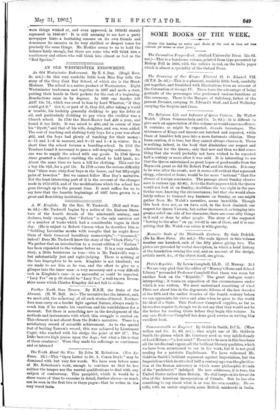The Religious Life and Influence of Queen Victoria. By Walter
Walsh. (Swan Sonnenschein and Co. 7s. 6d.)—It is difficult to give such ari appreciation of this volume as would cause no offence. It contains, as might be expected, dicaula tacendaque. The utterances of Kings and Queens are watched and reported, while those of humbler folk pass into a more fortunate oblivion. They learn caution, it is true, but they cannot always observe it. There is nothing, indeed, in the book that diminishes our respect and admiration for the Queen ; only that now and then we find some- thing that she would probably not have wished to be repeated half a century or more after it was said. It is interesting to see that the Queen entertained as great hopes of good results from the Maynooth grant as did Sir Robert Peel and his friends. It is easy to be wise after the event ; now it seems self-evident that a peasant clergy, educated at home, would be far more "national" than the alumni of foreign seminaries. The passage about Sunday observ- ance is curious (pp. 42-46). As to the State papers which the Queen would not look at on Sunday, doubtless she was right in the par- ticular case, knowing the circumstances ; but that she would abso- lutely refuse to transact any business on Sunday, as one might gather from Mr. Walsh's narrative, seems incredible. Though this book does not, as we have said, in the least diminish our respect for Queen Victoria, but rather increases it as bringing into greater relief one side of her character, there are some silly things in it said or done by other people. The story of the supposed "bowing to the altar" on pp. 161-62 is one of them, and it is sur- prising that Mr. Walsh can relate it with gravity.










































 Previous page
Previous page